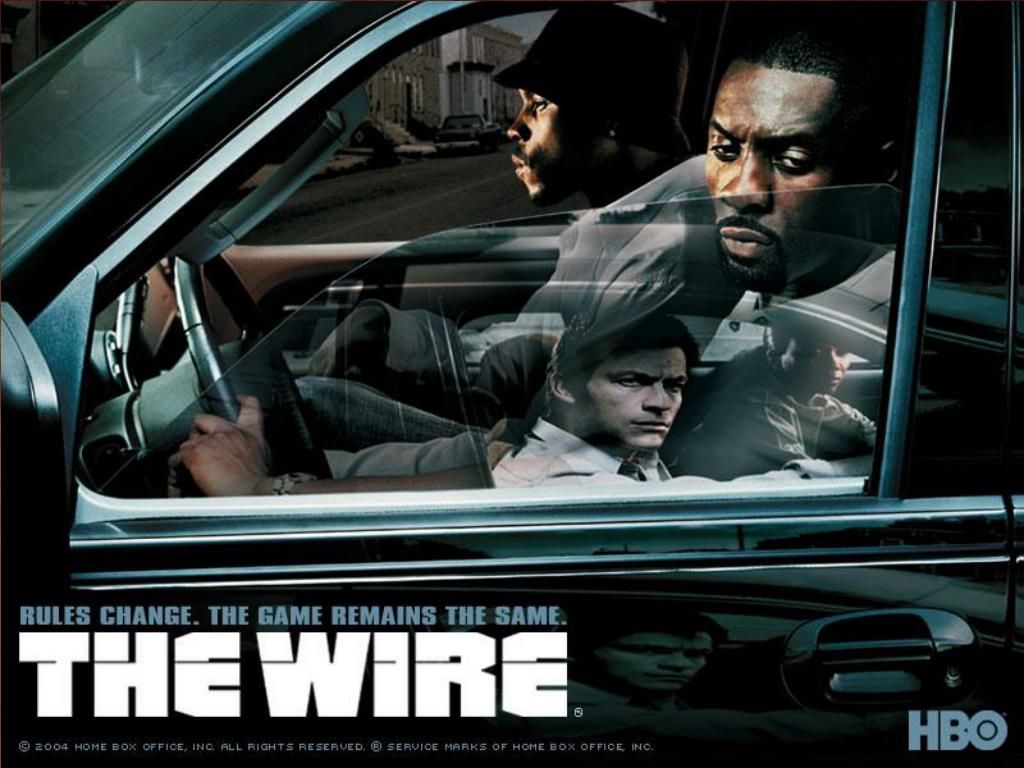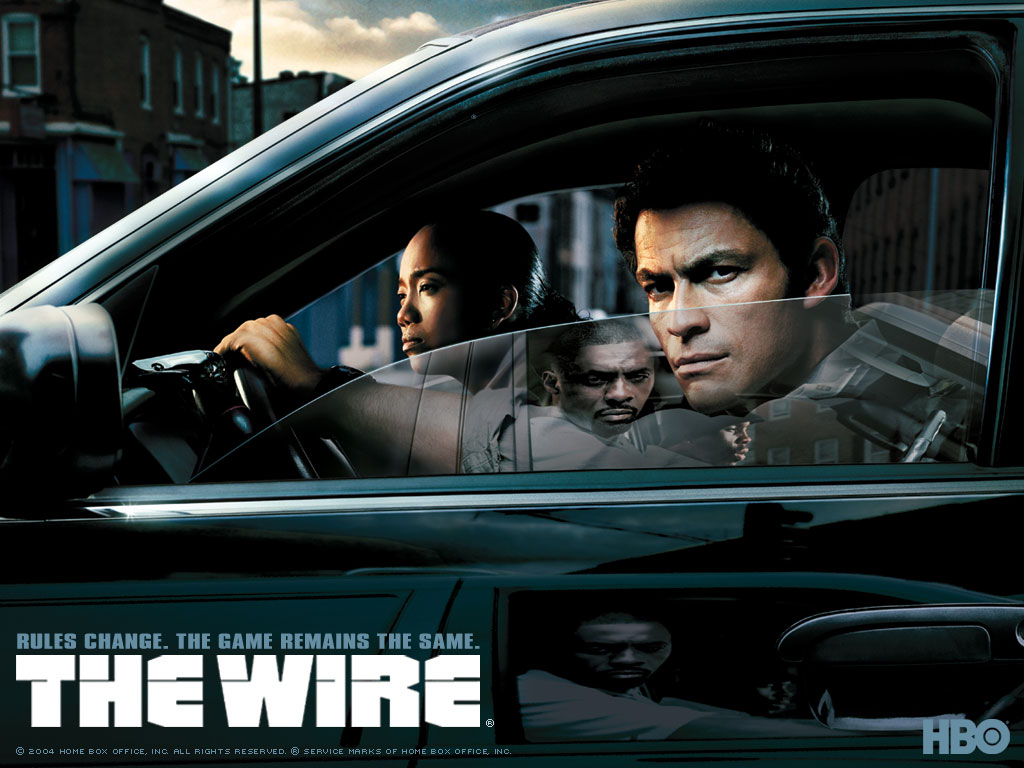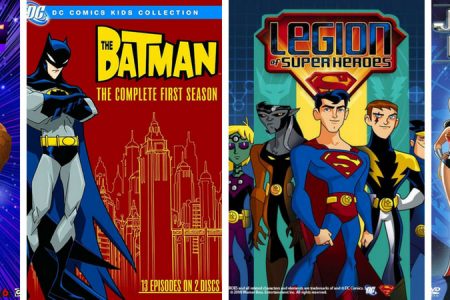It’s embarrassing to attempt writing about The Wire when my writing skills are as limited as they are, but I had put down some thoughts about this programme because I absolutely fucking loved it, and it definitely deserved all the attributes of ‘the best programme on television’.
I came to the series late: I don’t have FX, where it first showed here in the UK; I didn’t get the DVDs sight unseen; I waited until it was shown in concentrated form on BBC2, filling up the PVR and hoping nothing went wrong with the recording. But the only problems this created was avoiding any spoilers, and hoping it would live up to the hype. It did.
The first season was about a police unit investigating drug-related crime in West Baltimore, but it was also about the actual drug dealers themselves, making them into people rather than generic bad guys for our good guys to arrest – you got to know Avon Barksdale, Stringer Bell, Bodie as human beings. The show was detailed, it was full of characters that you had to remember by name, there was no ‘Previously, in The Wire …’, and there was no real star (Dominic West as Jimmy McNulty could be seen to be the nominal lead, but that’s a stretch); it was an ensemble cast where, for the first time, I didn’t know which name corresponded with which character – this was a real boon for the series, because the ensemble of television actors really became their characters.
The first season was really good, but then The Wire changed track completely by making the second season about the Baltimore docks and the crime that went on there under the control of the union leader, Frank Sobotka, just to keep the docks working and his men in a job; the bizarre thing was that the investigation of this was instigated by the petty jealousy of police commander Valchek, who was pissed off that Sobotka had paid for a new window at the local church and got it in a prominent position. It gave a whole new side to Baltimore and the police and the way things worked, and was a really brave thing to do for a show that hadn’t done great in the ratings. And, of course, it was really good.
The third season expanded the breadth of what the show was examining: the creation of ‘Hamsterdam’ by Major Colvin as an attempt to control drug-related crime and the numbers he had to present to his bosses on a monthly basis; the political world was introduced as we followed the mayoral aspirations of Tommy Carcetti; the introduction of Marlo Stansfield, moving into the territory left over when Avon Barksdale was imprisoned; as well as seeing ‘the life’ from the other side when Dennis ‘Cutty’ Wise tried to go straight after a long stretch in prison. And, naturally, the show was really good.
 The fourth season is widely acknowledged to be the best series of The Wire, and it’s difficult to argue otherwise. The scope and emotional power of the stories in this season were incredible, and the team creating this were at the height of their powers. The main focus was the school system, as one of the detectives from the earlier seasons (‘Prez’ Pryzbylewski) had become a teacher after having to leave the police, and observing the attempts of the education system and the troubles it witnesses and the way kids are shaped by external forces produced some devastating television. The way that life and politics were playing into this, while the police continued in their jobs, was brought vividly onto the screen and highlighted what a complicated mess modern society inhabits.
The fourth season is widely acknowledged to be the best series of The Wire, and it’s difficult to argue otherwise. The scope and emotional power of the stories in this season were incredible, and the team creating this were at the height of their powers. The main focus was the school system, as one of the detectives from the earlier seasons (‘Prez’ Pryzbylewski) had become a teacher after having to leave the police, and observing the attempts of the education system and the troubles it witnesses and the way kids are shaped by external forces produced some devastating television. The way that life and politics were playing into this, while the police continued in their jobs, was brought vividly onto the screen and highlighted what a complicated mess modern society inhabits.
The fifth season was always going to find it hard to match the highs of the fourth season, but it was still excellent; the trouble for me was seeing the ‘good guys’ we had come to admire doing terrible things in the name of justice that you just knew was going to end badly. You expected the drunken and philandering McNulty to fuck up, but not for ‘good po-lice’ Lester Freamon to help with McNulty’s ridiculously ill-thought-out plan to get funding for the Major Crimes Unit. The ramifications of his act on the city, on the now mayor Carcetti, fellow officers and on the people working at The Baltimore Sun newspaper (a big focus of this season) were huge, and we got to see it all.
To creator David Simon (author and former police reporter for The Baltimore Sun) and Ed Burns (former homicide detective), and the many fine writers who worked on the show: I want to thank you for The Wire. It was brilliant, it was powerful, it was emotional and it was magnificent. It ended beautifully in that final episode, leaving me sad that it was over but emotionally satisfied. Thanks for the characters I grew to know and love, even the ones you were supposed to hate: McNulty, Bunk Moreland, Kima Greggs, Cedric Daniels, Jay Landesman, Lester Freamon, Prez, Carver, Herc, Burrell, Rawls, Avon, Stringer, D’Angelo, Bodie, Wee-Bey, Omar, Bubbles, Proposition Joe, Slim Charles, Chris Partlow, Snoop, Cheese, Nicky Sobotka, Ziggy, Clarence Royce, Clay ‘Sheeeeeeeeeeeeeeeeeeeee-it’ Davis, Maurice Levy, Rhonda Pearlman, Michael, Dukie, Namond and Gus Haynes, to name a few. And thanks for having something to say about the world while entertaining us and making us think.




